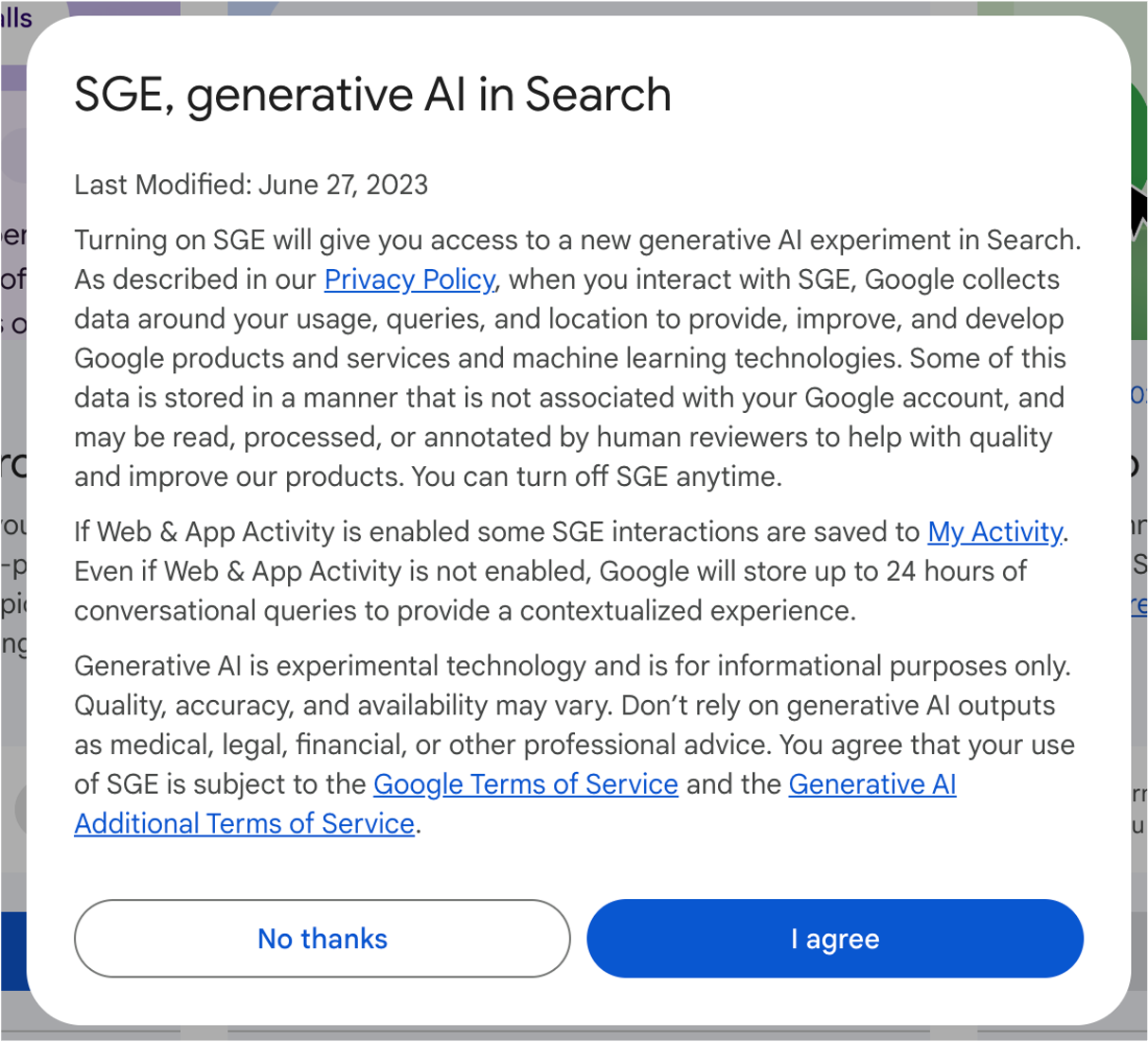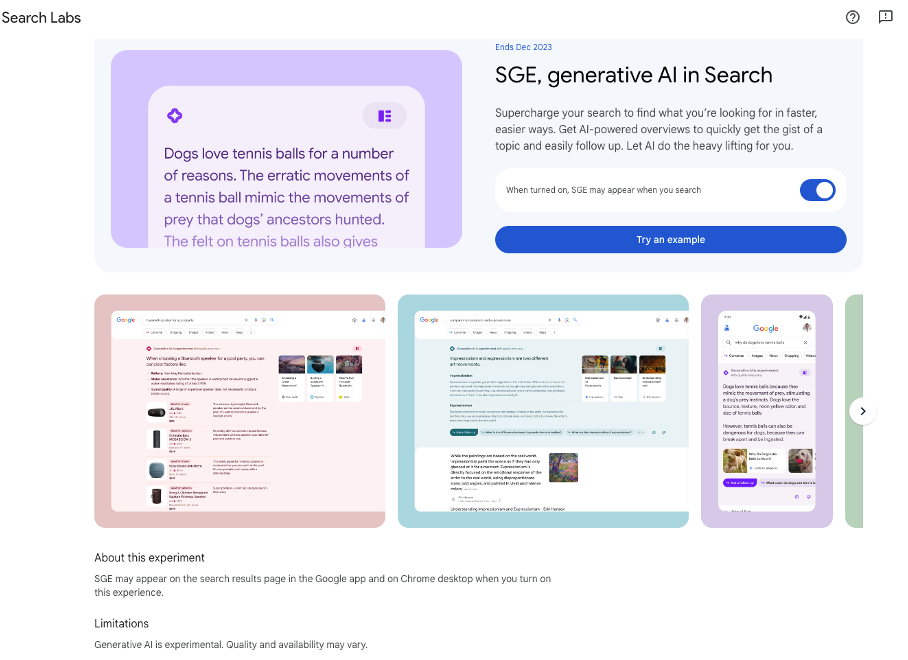AI Search & Research Tools
“By far, the greatest danger of Artificial Intelligence is that people conclude too early that they understand it.”
-- Eliezer Yudkowsky
AI for Search & Research
AI for Search and Research
- "Search Generative Experience (SGE)":
https://labs.google/sge
GOOGLE'S SEARCH ENGINE TAKE ON CHAT
Google has finally decided that it's time to show why they're just the undisputed leader in the industry. With the introduction of new ways to find information, enjoy your search experience and interact with the Web much better than any AI chatbot. In this video, we'll be showing you how they plan to do this and what to expect.
GOOGLE'S SEARCH GENERATIVE EXPERIENCE
Google announced that it would be improving its search experience to deliver creative results using generative AI. With their improved search methods, Google aims to help users get answers in a simple and conversational way without having to scroll through several pages.
HOW GOOGLE'S SEARCH ENGINE IS TAKING SHOPPING TO ...
Google has launched the Google SGE as an experiment in the Google Search Labs initiative. Users will be able to see how a dress looks in a variety of real models before making the decision to buy it. At the moment, the SGE is only available to users in the United States. No information on when it will be released to the general public.
Sentiment Analysis
36 positive sentences, and 2 negative ones were identified

USE SCOPUS AI FOR EMPIRICAL RESEARCH
Research papers by query and synthesize the findings of decades of research into clear digestible summaries, in seconds. Scopus AI creates digestible summaries of some 27,000 academic journals.
Scopus AI is a generative AI-enhanced research tool integrated into the Scopus website to help early-career academics and researchers working across different disciplines to navigate and understand academic content. It assists users in comprehending unfamiliar academic fields, facilitating exploration, providing a summarized view based on Scopus titles and abstracts, and soon, a visual graph representation for a broader perspective based on associated keywords.
HOW TO USE ELICIT FOR EMPIRICAL RESEARCH
Elicit will return answers from academic papers. We search over about 200 million papers using the corpus from Semantic Scholar. You can start by asking a question, but sometimes you might not know what question to ask. And so you can get much more interesting results when you use elicit.
Once you have the information that you need and the papers you want, you can export it as a CSV. It will show you where in the paper the information is coming from as well. Even if it's not right, it'll point you to the most relevant part of the paper where that information exists.
Sentiment Analysis
16 positive sentences, and 13 negative ones were identified
HOW TO WRITE A RESEARCH PROPOSAL IN 2 DAYS
Is it possible to write a research proposal in just two days? Jan Kirschner, research at OpenAI shares his illicit workflow. Then he goes to the summarization task, which takes an abstract as an input. All in all, he might be able to write one of these project proposals in two or three days.
AN OVERVIEW OF THE NEUROSCIENCE LITERATURE WITH LISTIT
When you're using elicit to summarize or to generate research, questions they are sort of concerned about. Maybe perhaps it's less relevant within neuroscience for sort of bias. The more you optimize something, the more fragile it becomes. How do you take that into consideration?
PROJECTS IN MARKDOWN: THE ITERATIVE PROCESS
Using a language model to expand individual claims into paragraphs sidesteps any writer's block I might have, right? And doing this editing process of iteratively, refining something is so much easier than to write it perfectly from scratch.
Sentiment Analysis
31 positive sentences, and 15 negative ones were identified.
PI AI: THE NEW KING OF AI CHAT
Pi AI. Is the newest rock star in the field of AI. It's designed to be super friendly and supportive. Think of Pi as the BFF you've always wanted, but in digital form. Pi isn't just about intelligence, it's about emotional intelligence too.
PI AI
Pi AI is your free therapist that you can talk to any time of the week. It breaks down complex situations step by step, guiding you towards clarity and confidence. People from all walks of life have been blown away by Pi's kindness and support.
PI AI: A VIRTUAL AI COMPANION
Pi AI is designed to satisfy your curiosity while maintaining utmost humility. It immerses itself in the unknown alongside you, igniting your inquisitiveness. Also your ultimate partner in fun. Designed to adapt to your unique needs and preferences. Safety is the most important feature of Pi AI.
Sentiment Analysis
72 positive sentences, and 8 negative ones were identified.
PI AI: THE NEW KING OF AI CHAT
Text-generation models are AI models trained on vast amounts of text. When prompted, they can generate new content by rearranging and combining phrases. Such models can only generate content based on its training data – so while 'new' in the sense of its ordering, the information is never exactly new.
Results can seem human-like and can be applied in use cases ranging from creative-writing assistance to conversational AI chatbots. However, the technology also raises concerns about potential misuse for generating misinformation, impersonating others online and even legal issues relating to copyright and privacy.
PI AI
Pi AI is your free therapist that you can talk to any time of the week. It breaks down complex situations step by step, guiding you towards clarity and confidence. People from all walks of life have been blown away by Pi's kindness and support.
Meta Debuts AudioCraft: Its Text-to-Audio or Music Models
- Meta's AudioCraft consists of three models: MusicGen, AudioGen and EnCodec.
- MusicGen generates music from text and AudioGen is a text-to-audio generator.
- All models are open source to researchers and practitioners.
https://audiocraft.metademolab.com/.
https://aibusiness.com/nlp/meta-open-sources-audiocraft-its-text-to-audio-or-music-models
AI Code Generation Models: The Big List
Text-to-code AI models use machine learning to generate snippets of code or entire functions. These models are trained on vast amounts of public code and are designed to aid human developers.
Text-to-code AI models take natural language inputs – plain English – and can turn it into code.
https://aibusiness.com/nlp/ai-code-generation-models-the-big-list
AI Image-Generation Models and Tools: The Ultimate List
Text-to-image AI models take inputs in the form of text prompts and produce an image matching the description using machine learning and deep neural networks.
These models work by training on large datasets that contain both images and corresponding textual descriptions. They learn to understand the relationship between specific words and phrases and the visual components they represent. When a user provides a new textual input, the model uses what it has learned to generate an image that it believes corresponds to the description.
https://aibusiness.com/nlp/the-essential-list-ai-image-generation-models-and-tools
The Essential List: AI Text-Generation Models and Apps
Text-generation models are AI models trained on vast amounts of text. When prompted, they can generate new content by rearranging and combining phrases. Such models can only generate content based on its training data – so while 'new' in the sense of its ordering, the information is never exactly new.
Results can seem human-like and can be applied in use cases ranging from creative-writing assistance to conversational AI chatbots. However, the technology also raises concerns about potential misuse for generating misinformation, impersonating others online and even legal issues relating to copyright and privacy.
https://aibusiness.com/nlp/ai-text-generation-models-and-apps-everything-you-need-to-know
Text-to-Video Generative AI Models: The Definitive List
Text-to-video models, as the name suggests, use natural language prompts as input to generate a video. These models use advanced machine learning or deep learning techniques or a recurrent neural network to understand the context and semantics of the input text and then generate a corresponding video sequence.
Text-to-video AI models require massive amounts of data and computing power to train, and the field is still evolving. Such models could be used to create video content for advertising or entertainment or aid in film production processes.
https://aibusiness.com/nlp/ai-video-generation-the-supreme-list

